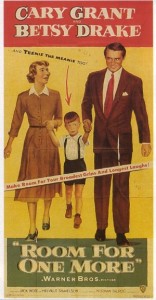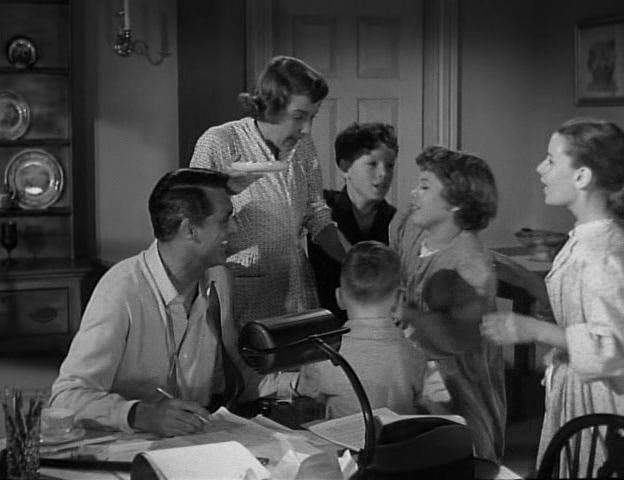“There’s nothing wrong with him that being three days old wouldn’t fix.”
|

Synopsis:
When the parents (Cary Grant and Betsy Drake) of three children (George Winslow, Gay Gordon, and Malcolm Cassell) decide to bring two additional foster children (Iris Mann and Clifford Tatum, Jr.) into their household, both challenges and triumphs abound.
|
|
Genres, Themes, Actors, and Directors:
- Adoption
- Cary Grant Films
- Orphans
- Raising Kids
Review:
This Norman Taurog-directed adaptation of Anna Perrin Rose’s memoir about her experiences integrating several troubled foster kids into her home remains a minor cult favorite of those who recall seeing it on television years ago. While a bit didactic at times, the storyline nonetheless nicely portrays the chaos of family life in a semi-realistic fashion, showcasing how exhausting yet rewarding parenting can be. Real-life married couple Cary Grant and Betsy Drake are aptly cast, with Grant exhibiting his characteristically droll sense of humor (listen for a throwaway line early on about their cat’s new litter of kittens — something about a bicycle…), and Drake admirably demonstrating effective parenting techniques when dealing with seemingly “unhelpable” children. Unfortunately, the film drags on a bit too long towards the end, as both foster kids are given an opportunity to fulfill their personal dreams, and we’re asked to watch nearly every second of it unfolding in real-time; otherwise, film fanatics will likely be pleasantly surprised by Taurog’s sensitive handling of the emotionally-laden storyline.
Redeeming Qualities and Moments:
- A refreshingly honest depiction of how hectic, challenging, yet loving a large household can be

Must See?
No, though it’s recommended as a minor cult favorite.
Links:
|
One thought on “Room for One More (1952)”
First viewing. Not must-see.
It’s difficult being critical of a well-meaning film about selfless love. The film’s earnestness is palpable and its heart is definitely in the right place.
Problem is the film is woefully uncinematic. It has a flat style; it’s episodic and doesn’t build to much – it more or less ends where it begins, so there’s little by way of surprise.
~although I’ll admit I perked up near the end when Grant visits the home of the boy whose mother reveals her own prejudice when she won’t allow her son to take Grant’s foster child to a dance.
(I also wasn’t very taken with Drake’s bland performance. She may be loving but she also often seems in need of vitamin supplements…or something.)
Overall, the film seems much more suited to tv than the big screen.